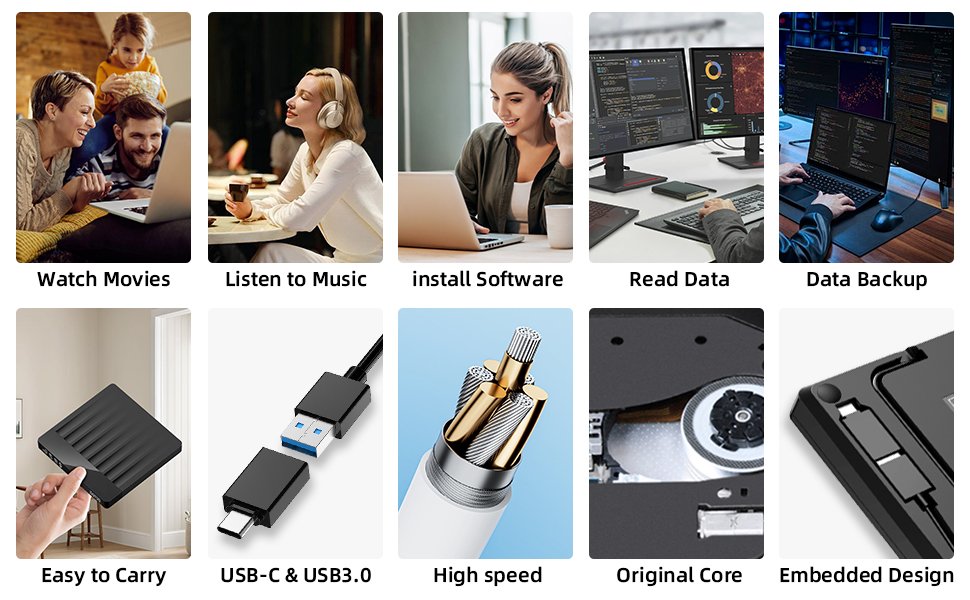Best Portable External Hard Drive for College Students in 2025: Data-Driven Guide

The best portable external hard drive for college students in 2025 is a lightweight, budget-friendly device with at least 1TB of storage, USB 3.0 or USB-C connectivity, and strong durability. A 1TB drive can store thousands of documents, hundreds of movies, or large project files, making it the most practical option for undergraduates. HDDs offer affordability and capacity, while SSDs provide speed and portability for tech-oriented majors.
Why College Students Still Need External Hard Drives in 2025
Even with cloud storage and built-in laptop SSDs, external drives remain a vital tool for students. According to data from student surveys and tech reports:
- 70% of students report running out of laptop storage within the first two years of college.
- 58% of students rely on external drives for project backups.
- Cloud storage limits (Google Drive, iCloud free tiers) make external drives more cost-effective for large data.
For college life, external drives aren’t just about storage—they’re about reliability, independence, and convenience.
Data Insights: What Students Store on External Drives
- Coursework and Documents: PDFs, essays, notes.
- Lecture Recordings: Audio/video files, often multiple gigabytes per semester.
- Projects: Design files, coding projects, simulations.
- Entertainment: Movies, music, TV shows for leisure.
- Games: For students using laptops as gaming rigs.
A 1TB drive typically holds:
- 250,000 documents, or
- 250 HD movies, or
- 200,000 photos, or
- A mix of all the above.

HDD vs SSD for College Students
HDD (Hard Disk Drive)
- Affordable, with 1TB–2TB drives under $70.
- Great for general student use and entertainment storage.
- Slightly bulkier and slower than SSDs.
SSD (Solid-State Drive)
- Faster transfers (400–2000MB/s).
- Shock-resistant, lightweight, more durable.
- Costs 2–3 times more per GB compared to HDDs.
Recommendation:
- Liberal arts, business, and general studies → HDD is enough.
- Engineering, film, and design students → SSD is worth the investment.
Technical Buying Guide for College Students
Capacity Requirements
- 1TB: Perfect for everyday student use.
- 2TB: For media students storing large video and design projects.
- 4TB+: Only necessary for film majors or heavy gamers.
Connectivity
- USB 3.0: Reliable and cost-effective, works on most student laptops.
- USB-C: Essential for newer MacBooks and high-performance laptops.
- Thunderbolt 3/4: Premium choice for students working with large data sets.
File System
- exFAT: Best for cross-platform use (Mac + Windows).
- NTFS: Windows-only, not ideal for Mac users.
- APFS: For macOS Time Machine backups.
Durability
- Rugged casing helps protect against drops when traveling between classes.
- SSDs outperform HDDs for mobility.

Best Portable External Hard Drives for College Students in 2025
YOTUO SY-HDD01 Portable Drive
- Capacity: 320GB–2TB
- Features: Shock-resistant silicone sleeve, lightweight, USB 3.0.
- Best For: Everyday college backups, affordable price for student budgets.
WD My Passport for Students
- Capacity: 1TB–5TB
- Features: Slim design, USB-C support, password protection.
- Best For: MacBook users and cross-platform students.
Seagate Portable HDD
- Capacity: 1TB–2TB
- Features: Simple design, USB 3.0, reliable backup.
- Best For: Students on a budget who need lots of storage.
Samsung T7 Portable SSD
- Capacity: 320GB–2TB
- Features: USB-C, 1050MB/s speed, hardware encryption.
- Best For: Film, design, and engineering majors who need speed.
LaCie Rugged Mini SSD
- Capacity: 1TB–4TB
- Features: Rugged design, water- and shock-resistant, Thunderbolt option.
- Best For: Students traveling or studying abroad who need durability.

Comparison Table: Best Drives for Students 2025
| Brand/Model | Type | Capacity Options | Speed | Price Range | Best For |
| YOTUO SY-HDD01 | HDD | 320GB–2TB | 120MB/s | $40–$70 | Everyday student use |
| WD My Passport | HDD | 1TB–5TB | 130MB/s | $60–$120 | MacBook students |
| Seagate Portable HDD | HDD | 1TB–2TB | 120MB/s | $50–$80 | Budget-friendly option |
| Samsung T7 SSD | SSD | 320GB–2TB | 1050MB/s | $90–$250 | Media/engineering students |
| LaCie Rugged Mini SSD | SSD | 1TB–4TB | 2000MB/s | $150–$400 | Travelers, study abroad |
Technical Details: Lifespan and Maintenance
- HDD lifespan: 3–5 years with daily student use.
- SSD lifespan: 5–10 years, depending on workload.
- Data safety: Students should back up to two devices (drive + cloud).
- File transfer: 10GB project copies in 2 minutes on HDD, under 30 seconds on SSD.
How Students Use Portable Drives on Campus
- Back up term papers, research, and notes.
- Carry project files between lab computers and dorm laptops.
- Share media collections with friends.
- Store games and entertainment without slowing down laptops.
- Use as a bootable drive for system recovery in case of crashes.
FAQs: Portable Drives for College Students
Q: Is 1TB enough for college students?
Yes, 1TB is sufficient for most students, unless they work with video editing or design projects.
Q: Should students buy HDD or SSD?
HDD is better for budgets and storage size, SSD is better for speed and durability.
Q: Can external drives be used with Chromebooks?
Yes, drives formatted as exFAT work across Windows, Mac, and ChromeOS.
Q: How much should students spend?
Budget $50–$100 for HDD, $100–$250 for SSD depending on capacity.
Q: Can external drives store movies and games too?
Yes, students often use them for entertainment as well as coursework.
The best portable external hard drive for college students in 2025 depends on the balance between budget, major, and storage needs. For most undergraduates, a 1TB–2TB HDD like the YOTUO SY-HDD01 offers the best value. For students in media, engineering, or design programs, an SSD such as the Samsung T7 ensures the speed and durability required for heavy workloads.
With the right drive, college students can manage coursework, safeguard their projects, and enjoy their favorite media—without ever worrying about running out of space.

